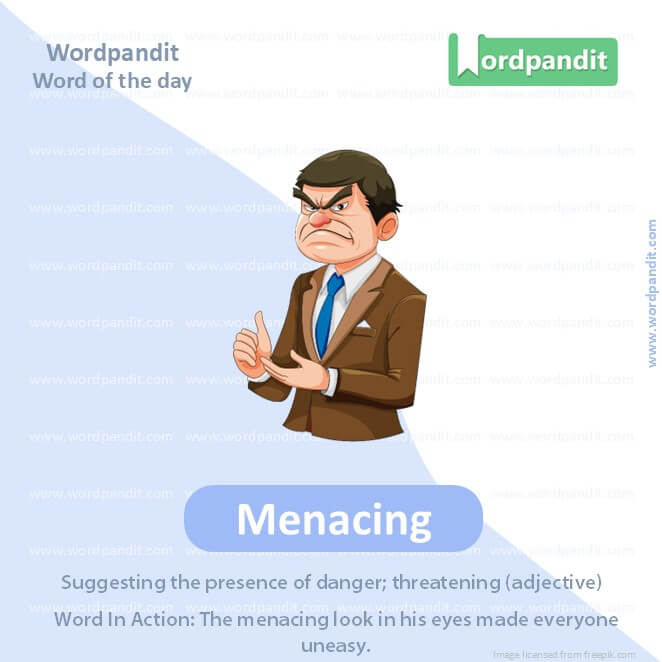Daily Vocabulary from International Newspapers and Publications
Expand Your Vocabulary with Wordpandit’s Global Vocabulary Hub
At Wordpandit, we are committed to helping you develop a truly global vocabulary by drawing from some of the most respected international publications. This section is designed to keep you ahead of the curve by introducing you to words that define global conversations and trends.
The Power of Global Sources
To help you think and communicate on a global scale, we curate vocabulary from renowned international sources, such as:
- The New York Times
- The Washington Post
- BBC
- The Guardian
- The Economist
- Scientific American
- Psychology Today
- And many more...
Stay Global, Stay Competitive
Our daily updates from international publications ensure you are consistently exposed to new words that reflect global news and developments, making sure your vocabulary is not only current but also globally relevant.
Enhance Your Global Perspective
Whether you’re preparing for international exams, aiming to excel in global business communication, or want to enhance your language skills for personal growth, Wordpandit offers the resources you need to thrive in a global context.
Effective Learning, Global Reach
Our learning methodology combines global examples, memory aids, and interactive activities, allowing you to internalize new words effectively and apply them in real-world scenarios.
Begin Your Global Vocabulary Journey Now!
Why Choose Wordpandit?
Practical Learning: Focus on words you'll actually encounter in real-world reading, enhancing your comprehension and communication skills.
Diverse Content: From current affairs to scientific breakthroughs, our varied sources expose you to vocabulary across multiple domains.
Effortless Integration: Make Wordpandit a part of your daily routine. Just a few minutes each day can significantly boost your lexicon over time.
Your Path to Vocabulary Mastery
- Visit our Daily Vocabulary section regularly
- Explore new words and their usage in context
- Practice incorporating these words into your own writing and speech
- Track your progress as your vocabulary expands
Start Your Journey Today
Embark on your vocabulary enhancement journey with Wordpandit. By consistently engaging with our daily posts, you'll build a robust vocabulary that serves you well in academic, professional, and personal contexts.
Remember, a word a day keeps linguistic limitations at bay. Make Wordpandit your daily companion in the quest for vocabulary excellence!
WORD-1: Proliferation
Context:
"There was a proliferation of scandals." - The New York Times
Explanatory Paragraph:
Proliferation refers to a rapid increase or spread of something, especially when it happens at an accelerating rate. In this case, it refers to the swift and extensive spread of scandals.
Meaning: A rapid increase in numbers or spread of something (noun)
Pronunciation: pruh-lif-uh-RAY-shun
Difficulty Level: ⭐⭐⭐ (Intermediate)
Etymology: From Latin proles (offspring) and ferre (to bear), referring to the idea of multiplication or increase.
Synonyms & Antonyms:
Synonyms: expansion, surge, spread, growth, multiplication
Antonyms: decline, decrease, reduction, contraction
Usage Examples:
- The proliferation of smartphones has changed the way people communicate worldwide.
- Environmentalists are concerned about the proliferation of plastic waste in the oceans.
- The proliferation of new technologies has disrupted many traditional industries.
- There was a rapid proliferation of startups in the tech industry during the 2000s.
Cultural Reference:
"The nuclear proliferation issue is a big concern for international peace and security." - A common topic in global diplomacy discussions.
Think About It:
How can societies control the proliferation of harmful information while promoting the free spread of knowledge?
Quick Activity:
List three modern examples of proliferation in different fields (e.g., technology, social media trends, etc.).
Memory Tip:
To remember "proliferation," think of "pro-life" and "generation," hinting at something rapidly generating or spreading.
Real-World Application:
The term "proliferation" is often used in discussions about technology, politics, and social issues to describe fast-growing trends, ideas, or products.
WORD-2: Torrent
Context:
"Their presence, and a torrent of threats, forced local officials to cancel the annual CultureFest." - The Washington Post
Explanatory Paragraph:
A torrent refers to something that is overwhelming in force or quantity, often in the form of a sudden, large outpouring. In this context, it refers to a flood of threats that forced the cancellation of an event.
Meaning: A sudden, violent, and copious outpouring of something (noun)
Pronunciation: TOR-uhnt
Difficulty Level: ⭐⭐ (Beginner)
Etymology: From Latin torrentem (rushing, roaring stream), from torreō (to parch, scorch).
Synonyms & Antonyms:
Synonyms: flood, deluge, surge, stream, outpouring
Antonyms: trickle, drip, scarcity
Usage Examples:
- After the news broke, a torrent of emails flooded his inbox.
- The torrent of rain caused severe flooding in the city.
- She unleashed a torrent of anger after hearing the unfair accusations.
- A torrent of questions followed the politician's controversial statement.
Cultural Reference:
"The torrent of social media posts after a major event shows how quickly information can spread." - A common observation in modern culture.
Think About It:
How can we effectively manage a torrent of information in the digital age without feeling overwhelmed?
Quick Activity:
Write a sentence describing a time when you experienced a torrent of emotions. How did you handle it?
Memory Tip:
Remember "torrent" by thinking of a "torrential downpour" — a sudden, overwhelming amount of rain.
Real-World Application:
In real life, "torrent" is often used metaphorically to describe overwhelming quantities, such as a torrent of work, threats, or emotions.
WORD-3: Menacing
Context:
"It is unsettling to live in this menacing atmosphere." - The Washington Post
Explanatory Paragraph:
Menacing describes something that feels threatening or dangerous. In this context, the word refers to an environment or atmosphere that creates a sense of fear or danger, making people feel uneasy.
Meaning: Suggesting the presence of danger; threatening (adjective)
Pronunciation: MEN-uh-sing
Difficulty Level: ⭐⭐ (Beginner)
Etymology: From Old French menacier meaning "to threaten," derived from Latin minacia meaning "threats."
Synonyms & Antonyms:
Synonyms: threatening, intimidating, ominous, hostile
Antonyms: friendly, welcoming, harmless, comforting
Usage Examples:
- The menacing clouds loomed over the city, signaling an impending storm.
- The villain's menacing stare sent chills down her spine.
- The menacing tone in his voice made it clear he was not joking.
- She felt a menacing presence behind her as she walked through the dark alley.
Cultural Reference:
"Darth Vader's menacing presence in the Star Wars films is a hallmark of his character, making him one of cinema's most iconic villains." - A pop culture reference.
Think About It:
Why do certain situations or people feel menacing, even without direct threats? How do we interpret these cues?
Quick Activity:
Think of a scene from a movie or book where the atmosphere felt menacing. Describe what elements contributed to this feeling.
Memory Tip:
To remember "menacing," think of a "menace" — something or someone that causes fear or threat.
Real-World Application:
"Menacing" can be used to describe anything from a dangerous person or animal to an ominous situation, helping to convey a strong sense of danger.
WORD-4: Scurrilous
Context:
"These scurrilous stories propelled by former president Donald Trump." - The Washington Post
Explanatory Paragraph:
Scurrilous refers to language or claims that are meant to offend, damage someone's reputation, or spread false accusations. In this context, it implies that the stories being spread are not only offensive but also intended to harm or defame.
Meaning: Making or spreading scandalous claims about someone with the intention of damaging their reputation (adjective)
Pronunciation: SKUR-uh-lus
Difficulty Level: ⭐⭐⭐ (Intermediate)
Etymology: From Latin scurrilis meaning "coarsely jesting" or "buffoon-like," referring to low or vulgar humor.
Synonyms & Antonyms:
Synonyms: defamatory, slanderous, libelous, insulting, abusive
Antonyms: respectful, honorable, complimentary, flattering
Usage Examples:
- The politician was furious over the scurrilous accusations made against him in the media.
- Her reputation was damaged by scurrilous gossip spread by her rivals.
- The article was filled with scurrilous remarks aimed at discrediting the CEO.
- Despite the scurrilous attacks, she maintained her dignity and refused to respond in kind.
Cultural Reference:
"Scurrilous attacks in political campaigns are not new, as history is full of smear tactics designed to damage opponents' reputations." - A historical reference to political mudslinging.
Think About It:
Why do scurrilous claims spread so easily, even when they lack evidence? How can we guard against believing false accusations?
Quick Activity:
Write down three ways to respond effectively when confronted with scurrilous rumors or false claims.
Memory Tip:
To remember "scurrilous," think of "scurry" — as in how scurrilous rumors often spread quickly, like people scurrying around to gossip.
Real-World Application:
The word "scurrilous" is often used in the context of media, politics, and gossip to describe harmful and slanderous content intended to defame others.
WORD-5: Xenophobic
Context:
"The hurtful and xenophobic lies about Springfield." - The Washington Post
Explanatory Paragraph:
Xenophobic refers to a fear or hatred of people from other countries, cultures, or ethnicities. In this context, the term is used to describe lies or narratives aimed at fostering intolerance or prejudice against outsiders or foreigners.
Meaning: Showing dislike or prejudice against people from other countries (adjective)
Pronunciation: zee-nuh-FOH-bik
Difficulty Level: ⭐⭐⭐ (Intermediate)
Etymology: From Greek xenos (stranger, foreigner) and phobos (fear), meaning "fear of the foreign."
Synonyms & Antonyms:
Synonyms: intolerant, prejudiced, bigoted, nationalist
Antonyms: tolerant, accepting, open-minded, inclusive
Usage Examples:
- The xenophobic rhetoric in the campaign created a tense and divisive atmosphere.
- She felt deeply hurt by the xenophobic comments directed at her immigrant family.
- The government's policies were criticized as xenophobic, harming international relations.
- His xenophobic attitudes made it difficult for him to embrace cultural diversity.
Cultural Reference:
"Xenophobic ideas have been a part of many historical conflicts, where fear of the 'other' led to discrimination, segregation, and violence." - A historical reflection on xenophobia in society.
Think About It:
How can we foster greater understanding and empathy in a world where xenophobic attitudes still persist?
Quick Activity:
Write down three ways you can promote inclusivity and combat xenophobia in your community or workplace.
Memory Tip:
To remember "xenophobic," think of "xeno-" meaning foreign and "phobic" meaning fear, linking it to the idea of fearing or disliking foreigners.
Real-World Application:
"Xenophobic" is often used to describe actions or language that express a fear of or hostility toward immigrants, minorities, or those perceived as outsiders, highlighting an ongoing social issue.















